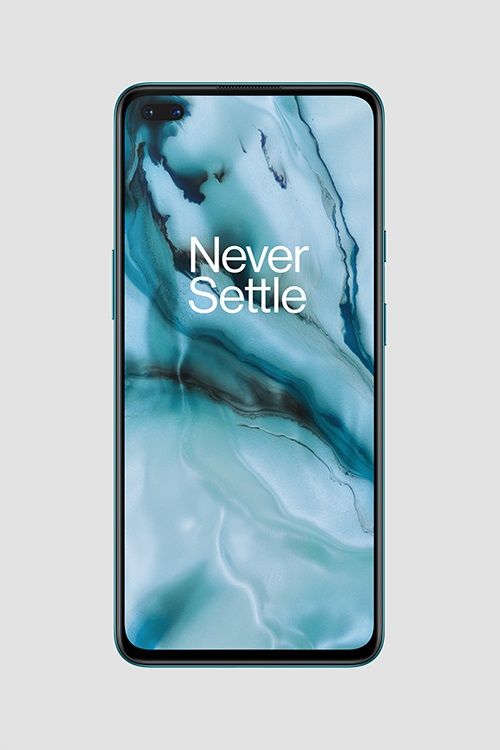OnePlus has just unveiled the OnePlus Nord, undoubtedly the star of the company’s Augmented Reality-powered show. Alongside the OnePlus Nord, the company also announced the OnePlus Buds, a pair of truly wireless earbuds for just ₹4,990/$79/£79/€89. I’ve been using them for a few days now and really like them for the price. They’ve been the only truly wireless earphones to pull me away from the OPPO Enco Q1 wireless earphones that I’ve been using since late last year. I’ve reviewed the Honor Magic Buds, I got a pair of the Mi True Wireless 2 earphones, and yet the OnePlus Buds have trumped them both.
The OnePlus Buds are some of the only TWS earbuds to fully support Google’s Fast Pair features, including Fast Pair itself for quickly pairing to a new device, Battery Details upon connection (the heads-up notification with the battery life of each bud and case), and Find My Accessory (“Find device” in Settings). That means if you have any modern Android device with Google Play Services, it’s a breeze to connect and interact with the OnePlus Buds. You’ll even get a battery detail notification on any device that you’ve ever paired the earphones with, even if it’s not the actively connected device. I wrote this review alongside our Editor-in-Chief Mishaal Rahman, who received a pair of these earbuds for review as well.

Note: I received the OnePlus Buds in white from OnePlus UK on July 17th, 2020. I have been using them daily since. OnePlus did not have any inputs in this review.
Design and features

The OnePlus Buds feature a rather “safe” design, in that they don’t stray too far from what you’d expect from a pair of truly wireless earphones beyond the standard set by the Apple AirPods. They look fantastic though. They come in a small white carrying and charging case, and the case itself is charged via USB-C. I’m confused by the lack of wireless charging though, especially given that the top OnePlus flagship, the OnePlus 8 Pro, features wireless charging and reverse wireless charging as a highlight feature.
They fit easily in my pocket alongside my phone or alongside my wallet in my other pocket. The charging case has a button on the back that, when held, puts the earphones in pairing mode. When in pairing mode, the LED on the front changes to white. It’s a pretty simple and painless process.

The earphones are rather small and fit nicely in my ears, though the lack of silicone tips means that they can’t form a proper seal. This means that when moving around, they can come a little loose and as a result, they can sound very different. The heads of earphones have a sensor to detect when they’re in your ears so that they can pause whatever is playing when you remove them. When you put them back, they’ll continue playing as well. They’re pretty comfortable to wear for long stretches of time, though again, the lack of gel silicone tips means they do eventually begin to hurt a little bit. Despite their lack of seal, the audio leakage is minimum. Finally, the OnePlus Buds also feature IPX4 water resistance.

There is a low latency mode that can be enabled for gaming when using Fnatic mode. Mishaal tested this using the Earbuds Delay Test app from the Google Play Store and found the delay to be around 150ms-200ms when not in Fnatic mode. With Fnatic mode on, the latency was around 100ms.
Earbuds Delay Test (Free+, Google Play) →
In terms of the technology employed in making these earphones work, they don’t have Qualcomm aptX support, and instead, only feature SBC and AAC. They will automatically enable AAC on the OnePlus Nord, but pairing them to another device (such as my POCO F2 Pro) uses SBC by default.

The POCO F2 Pro will default to SBC when paired with the OnePlus Buds.
The OnePlus Buds can also retain the pairing information for the last two devices that they have been paired with. Long pressing the side of the earphone will attempt to connect it to the last paired device, meaning that you can keep a rotation of two devices for listening. I paired the OnePlus Buds with two smartphones, though I used to pair my OnePlus Bullets with my laptop and with my smartphone, switching between them depending on which device I was using.
Mishaal has the Nord Blue OnePlus Buds, and they look fantastic.




OnePlus Buds Audio Quality

The OnePlus Buds pleasantly surprised me when it came to audio quality. While there is a definite bass boosting going on, it’s nowhere near as muddy or as invasive as it could be. The hardware is clearly capable of driving actual bass, and it’s nice and punchy in the ears. For $79 truly wireless earphones, this is a rather exceptional offer. The earphones have an extremely strong bass when pressing them into the ears, though I don’t think they’re designed to form a seal. They sound a bit unnatural when pressed in like that, and sound a lot better when in the ear, but not lodged in the ear canal.
Given the relatively low-cost of the OnePlus Buds, I was surprised that the audio quality was as good as it was. No these are not world-beaters, and a pair of wired earphones at lower price points would probably knock them out of the park. However, wireless earphones come at a premium due to the convenience factor and the tech required to make them possible, so you’ll certainly compromise on performance a little bit. Still, they’re earphones, and their primary use case is for listening to music. They provide a really good experience for the price, and their convenience coupled with good audio was enough to pull me away from the OPPO Enco Q1 wireless earphones I had been using since October 2019.
Their only downside is the lack of active noise cancellation, though I can understand that would have pushed the price up considerably. I’m so used to active noise-canceling earphones that using the Buds on the train was an annoying experience at first. You get used to being able to hear your surroundings again though, and you mentally filter out background noise the same way as you would with any other pair of non-ANC earphones. But the transition period exists, and if you strongly prefer ANC, the OnePlus Buds are expectedly not for you.
The earphones have really good call quality, as I’ve used them for a number of phone calls since receiving them. I did notice that when you half pull out one earphone, the microphone quality will sound really bad as if you are underwater. Keep this in mind if you’re on a call with someone and want to listen to your surroundings for a second. I also noticed that when taking out one earphone to talk directly into it (and while keeping the proximity sensor covered to prevent the buds from switching off), the microphone will be picked up very loudly by the other person for a second, only for the active microphone to then switch to the earphone still in your ear. This meant I couldn’t really whisper to the other person at all, as there was no way to talk directly into the microphone. I’ve used earphones that let you whisper, so the inability on the Buds is noticeable. Aside from that, the call quality is excellent and the “environmental noise cancellation” seems to work pretty well.
If you want to check out the playlist that I primarily tested the OnePlus Buds on, you can check that out here. Bass in songs such as Ego Death was replicated perfectly, while songs such as Lonely and Souk Eye were well-balanced and sounded excellent. Overall, everything in the linked playlist sounded more or less exactly as I expected them to sound.
OnePlus Buds Battery Life
The OnePlus Buds have some of the best battery life that I’ve ever seen from a pair of truly wireless earphones. OnePlus advertises that they can play for up to 7 hours each, and the charging case will then add an additional 23 hours totaling for 30 hours of battery life. In Mishaal’s testing, this 7-hour claim was more or less accurate. It took somewhere around 6 hours and 36 minutes for the right earphone to drain, while it took somewhere around 6 hours and 52 minutes for the left earphone. It does appear both of the earphones drain differently, as the right earphone also finished charging in the case about 7 minutes before the left earphone. When the earphones were entirely depleted, they took around 45 minutes to charge back up to 100% in the case. With 7-hour battery life and a rather fast in-case charging time, these earphones should easily keep you going through the day so long as you’re not using them for 7 hours straight.
Mishaal also found that the charging time for both fully depleted earbuds in the case and the case itself was around 1 hour and 13 minutes. The advertised time was 80 minutes. Mishaal notes that this is an imprecise measurement, as the LED indicator on the case didn’t turn from red to green until after he connected the Buds to his phone to check the battery life. He checked the battery level occasionally by connecting the Buds to his phone. OnePlus also says that 10 minutes of charging will net you 10 hours of playback, and while we haven’t tested that claim exactly, we both agree that a 10-minute charge does offer a lot of playback time. Coupled with the case then offering additional power too, the earbuds should easily get you through a day.
When it comes to charging as well, OnePlus says that any charger capable of outputting more than 10W of charging speed will be able to fast charge the OnePlus Buds. This means that you don’t actually need a Warp Charger to charge the OnePlus Buds at full speed – a standard 2A 5V charger should do the trick, along with the cable that you get in the box.
OnePlus Buds Controls

The OnePlus Buds offer a few gesture controls out of the box. They can be activated by double-tapping the sides or holding down on them, and they’re some of the easiest to access because of the shape of the earphones. Out of the box, double-tapping either earphone will skip the track, and holding down on it will switch to the previously connected device. While there is no long-press customization yet, the double-tap can be changed to play/pause, voice assistant, previous track, or next track. I wish that we could disable the long-press action entirely sometimes because I have found myself actually triggering it a couple of times already when lying down. It is also currently impossible to modify the gestures on non-OnePlus smartphones. We got the gesture customization early on the OnePlus Nord by installing the OnePlus Buds APK, but this won’t work on non-OnePlus devices.


When you remove one earphone from your ears, the music will stop, though will continue playing again if you put it back in within 3 minutes. I enjoy this feature for the most part, but I wish that this was also customizable. The OnePlus Buds can also work independently so that you can just listen with one earphone in and have the same gestures and automatic pause/play. For phone calls, you can answer or hang up a call with a double-tap of the touch area, and you can reject a call with a long press of the touch area for 5 seconds.
Because of the shape of the OnePlus Buds, the gestures are extremely accurate. Both Mishaal and I have had no issues with getting gestures recognized, thanks to the flat touch area which makes it obvious where to touch. Hopefully, OnePlus will add additional gesture controls in the future, and maybe a volume up/down gesture too, but for now, I’m mostly happy with the functionality that is already present.
Conclusion
The OnePlus Buds are a comfortable and excellent sounding set of truly wireless earphones. There are definitely some improvements to be made on both the software and hardware level, but for ₹4,990/$79/£79/€89, the package you get is excellent. I like the sound quality, the charging is fast, and the battery life is excellent. You can pick up the OnePlus Buds from OnePlus’ own store below.
The post OnePlus Buds Review – Good audio, better price appeared first on xda-developers.
from xda-developers https://ift.tt/32F39gF
via
IFTTT




















































